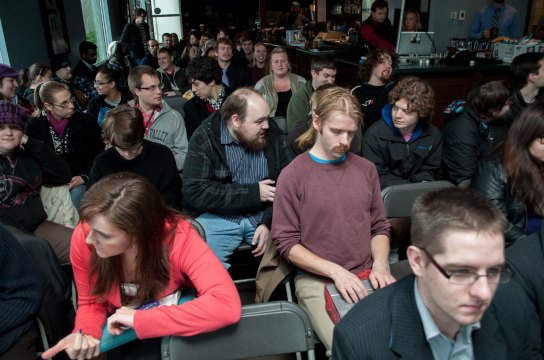By Nick Ubels (The Cascade) – Email
Print Edition: February 20, 2013
Nearly two-thirds of UFV students are women. Yet only 21 per cent of current SUS reps are female.
It’s not altogether surprising that such a wide gender gap exists in student government, but it is disheartening. With nomination packages for the upcoming board election due Friday, it’s worth taking a hard look at why this is the case and start talking about finding viable solutions.
Gender parity in political representation is vital to women’s empowerment. The university should be a place where persistent inequalities are rectified, not reinforced. There should be at least some cracks showing in the glass ceiling that has descended on the outside world.
Elsewhere on campus, the ratio is a little more equitable. At The Cascade, six out of 15 staff members, including three out of four sectional editors, are women. That totals 40 per cent. It’s not ideal, but we’re getting there. Meanwhile, the executive of the English Students Association is lightyears ahead, at 75 per cent women.
The percentage of female SUS reps at UFV is almost exactly the same as the 20 per cent of women representatives in Canadian House of Commons since 1997, according to a 2010 government study. The average number of female representatives in parliament hadn’t budged in the last 15 years until the May 2011 federal election, which saw an unprecedented 25 per cent of seats going to women.
It shows that progress is possible, but not easy.
That needed momentum must come from universities and colleges across the country. Experience in student government helps people prepare for public office and gain the confidence to pitch a campaign. Student government is an invaluable opportunity that promises a higher level of civic engagement later in life.
I don’t think guaranteed minimums are the solution in this case. There are far too many complications when quotas and voting collide that can compromise the democratic process. Not to mention that quotas can be incredibly patronizing. There’s a fine line between representative democracy and selecting competent, fairly-elected individuals to fill these roles. Such measures are merely a temporary fix to deeper societal problems.
There aren’t any outright restrictions or rules blocking women from running for SUS board positions, but faced with these numbers, it’s obvious that more needs to be done to encourage women to run. We need to reconsider the culture surrounding the student government and ask whether it’s still making the university’s female majority feel like outsiders where SUS is concerned.
In my capacity as editor-in-chief, I strive to create an equitable and open workplace, but I know there’s more I can do. Faced with numbers like these, I know that it’s something I have to do.
The issue reaches all the way back to childhood. Girls are taught to value nurturing roles and boys, leadership roles. These entrenched social expectations won’t change overnight, but in the meantime, we can find ways to encourage women to run for SUS board positions. This needs to come from current board members, professors, even fellow students. Perhaps SUS should host a workshop and information session for women interested in running for office. More women on the ballot means more women elected. Getting more women elected will help provide role models for other women interested in politics. Under-representation can be eliminated through this kind of momentum.
It’s commonly-held knowledge that it is difficult to find enough candidates to fill all of SUS’ positions. Many candidates go unchallenged and this problem will likely be worse this year after reps have been stripped of their honouraria.
By finding little ways to improve the outlook for women in student politics, we can help repair two persistent issues simultaneously. Change won’t happen overnight, but small, concerted efforts will add up in the long run.


